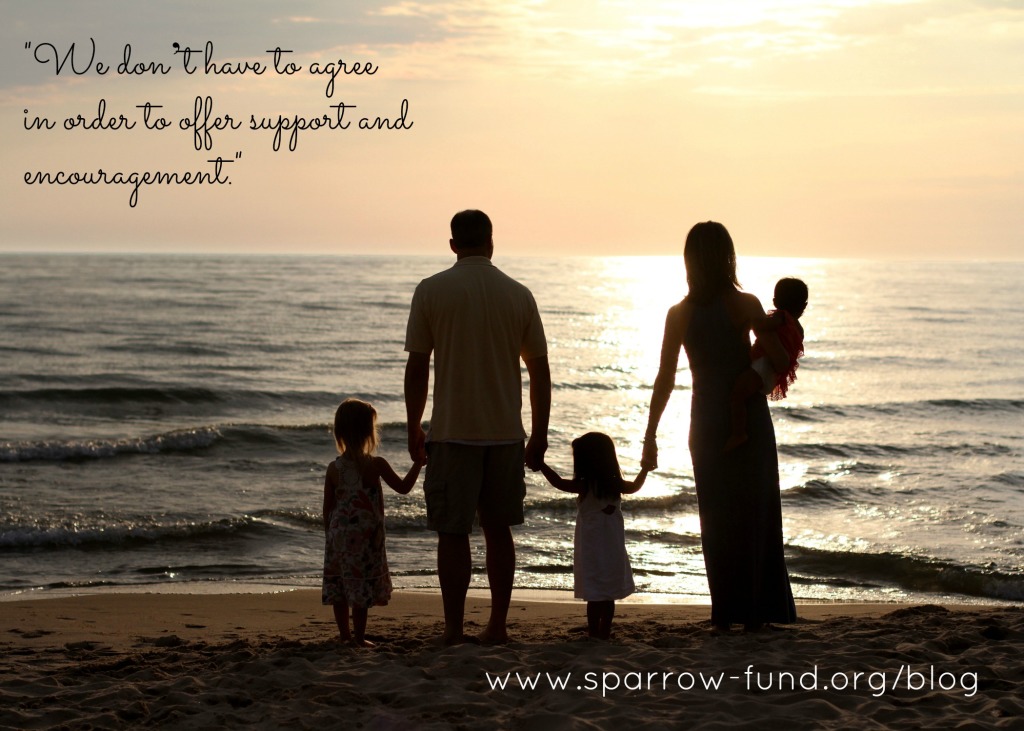Within the past few years it seems there has been a big emphasis placed on examining the terminology we use in talking about adoption.
Birth mother, first mother, expectant mom.
Kids of our own, biological kids.
Given up for adoption, placed for adoption.
But, does terminology matter? I believe it does. It’s also apparent that the adoptive community believes it does. Many adult adoptees will tell you that terminology matters to them as well. Thinking about, understanding and using various adoption terms in thoughtful and sensitive ways is greatly valued in the world of adoption. So, it only seems to follow that terms used in talking about adoptions that aren’t completed, fail, or are ended are understood and used in a thoughtful and sensitive way as well.
What is it called when a family does not complete an adoption they had begun?
What is it called when a family welcomes a child into their home intending on adopting him or her but end up not completing the adoption?
What is it called when an adoption is ended after the child has been placed in a home and the adoption process has been legalized?
As special needs adoptions have increased, the instances of failed or unsuccessful adoptions have also increased. Adoption is beautiful, but it is also complicated. Families, social workers, agencies, and governments all work to give children homes. But, medical files aren’t always accurate, governments aren’t always honest, special needs aren’t always clear, and the process is far from perfect.
Enter the home study. Hours of interviews and stacks of documents converge to outline what parameters a referred child must fall within. Agencies are not quick to allow families to diverge from what they are approved for in their home study. After all, many factors were taken into consideration to determine those parameters: income, family make up, ages of children already in the home, health insurance, proximity to health care professionals and specialists, etc.
As an adoptive community, we need to continue to encourage education and preparation for all potential adoptive parents. But, we would also do well to understand that even with all the education and preparation possible, adoptions may still end before placement, after placement but before finalization, or after finalization. How are we as an adoptive community going to respond? It goes without saying that our hearts are and will be broken for those children. Absolutely. But does that sympathy and empathy have to come at the expense of the adoptive parents?
I don’t understand how a family could end an adoption.
I don’t understand how a family could not bring home a child they intended on adopting.
You are right. You won’t be able to understand because you aren’t intimately involved in that situation. But, we don’t need to understand in order to minister to each other. We don’t have to agree in order to offer support and encouragement. We don’t have to like it in order to continue to enfold those parents within the adoption community.
If you’ll allow the analogy of preparing for marriage, an engaged couple is wise to do all they can to fully understand the commitment that marital vows require. However, even in Christian circles, we have all witnessed marriages that have fallen apart. Education and preparation aren’t always enough. But, when engagements or marriages fail, do we take to social media to dissect a situation we know very little about? Do we callously say, “How could they…?” “I can’t believe they…” “I would never…” On the contrary. We have come to realize that our world is broken. Our standard and our desire continues to be for every married couple to be beautifully united and eternally committed. But, we realize that when that doesn’t happen, the reasons are complex and complicated; the people involved are still God’s children and are hurting and in need of support. We realize that God’s love and work of redemption is not hindered by broken people or broken situations or broken promises. He is not a God who gets stopped at dead ends or unmet standards. His redemption story continues to unfold even in the midst of brokenness.
Years ago, we did not complete the international adoption of a child we intended to bring home. I felt like we carried the label of “the family who disrupted” as a scarlet letter. However, our experience of not completing an adoption of a child before the child was in our home is very different than a family who has enveloped a child into the fabric of their family only to have them taken out of their home or deciding that adoption is not the best choice for all involved. We can’t pretend the experiences and situations and resulting hurt are the same. And yet, so many do. We refer to every situation of an adoption stopping or ending as a “disruption.” Simply lumping all situations under the umbrella term of “disruption” is not helpful to the parents in that situation, the community called on to support, or the potential adoptive parents who are trying to learn all they can about what sometimes goes wrong. We need to consider more accurate terms.
Here’s a list to help: (Source: https://www.childwelfare.gov/pubPDFs/s_disrup.pdf)
An uncompleted adoption – An uncompleted adoption is an adoption in which the family decides not to adopt a child before the child is in their home and before the adoption is finalized.
A disrupted adoption – A disrupted adoption is an adoption that ends after the child is placed in the home but before the adoption is finalized.
A dissolved adoption – A dissolved adoption is an adoption that ends after the child is placed in the home and after the adoption is finalized.
Being sensitive to using correct terminology can go a long way in discerning what type of support those families may need. Offering caring support to these hurting families will go a long way in ending the shame and isolation they often feel.
So, does terminology matter in talking about adoptions that either don’t happen or don’t work out for the long term? Absolutely. Understanding and using the correct terms for each situation shows a general understanding of what the family went through which will directly impact the kind of pain they may be feeling and support they may be needing.
Terminology matters. We’ve known for quite some time that it matters to adoptive families and adoptees. It’s time to understand that it matters in these situations as well.
___________________________________
 18 years in the classroom as a teacher was easy compared to parenting three little ones at home full-time. Through their three daughters, God has revealed Himself most clearly to Stephanie and her husband Matthew. He not only worked a miracle in giving them their biological daughter, He continued to show Himself in mighty ways throughout adoption journeys in China and Bhutan that were anything but normal. Nowadays she enjoys encouraging and connecting with other adoptive families through speaking and her work on the leadership team of “We Are Grafted In” and on the Board of The Sparrow Fund.
18 years in the classroom as a teacher was easy compared to parenting three little ones at home full-time. Through their three daughters, God has revealed Himself most clearly to Stephanie and her husband Matthew. He not only worked a miracle in giving them their biological daughter, He continued to show Himself in mighty ways throughout adoption journeys in China and Bhutan that were anything but normal. Nowadays she enjoys encouraging and connecting with other adoptive families through speaking and her work on the leadership team of “We Are Grafted In” and on the Board of The Sparrow Fund.



Well said, my friend. Well said. I told you back in March and I meant it – your brave heart in sharing your story and opening the conversations is a gift to this community and I’m proud to call you friend.
Thank you, Tracy!